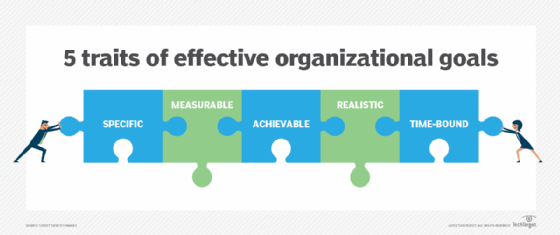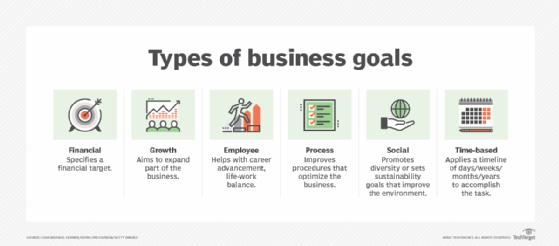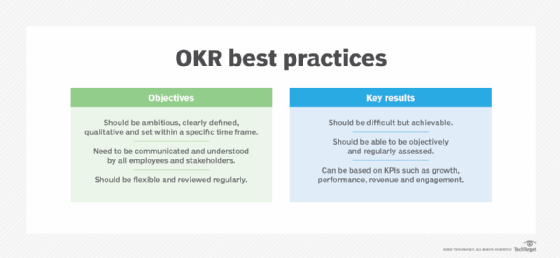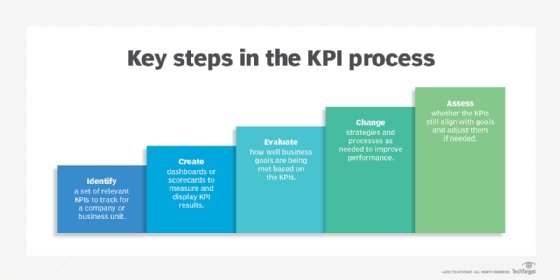business goals
What are business goals?
A business goal is an endpoint, accomplishment or target an organization wants to achieve in the short term or long term. Business goals can take many different forms and be aspirational or motivational, such as driving an organization toward a certain objective like improved customer service. They can also have very specific objectives, such as reaching a particular revenue target, net income, profit margin, profit goal or other financial milestone.
A mission statement is often seen as the definition of an organization's purpose and reason to exist, which is a form of a business goal. A vision statement is another common way for an organization to articulate its goals by providing an outlook on where it wants to go.
Why are business goals important?
Business goals are important for numerous reasons that can affect the overall operations and success of an organization.
- Business goals help measure progress. Business goals provide the milestones that can help an organization measure its success or lack thereof.
- Business goals set the direction of a company. Business goals allow all employees to have a clear idea of where the company wants to go and what it wants to be.
- Business goals establish accountability. Business goals enable management to take ownership of its successes or failures.
- Business goals improve decision-making. Business goals align the activities of the business so management can constantly evaluate decisions to ensure the business moves toward its target.
Business goals vs. business objectives
Business goals and business objectives are closely related, and the terms are sometimes used interchangeably. However, they are two different things.
Business goals represent the direction in which a company intends to go and define what the organization wants to achieve. A business objective specifies the methods and paths that can help a business achieve that goal.
For example, a business goal could be to reach a specific revenue target, while a business objective could be to close a deal with a large client to help the company achieve that financial goal.
What are the elements of a business goal?
A business goal comprises multiple components to be effective. At the most basic level, all business goals define what an organization wants to achieve within a given time frame. The acronym SMART is commonly used to help ensure that the right elements are present in a business goal.
- Specific. The business goal should be identified.
- Measureable. There should be some metric -- such as a percentage -- to measure progress.
- Achievable. There should be some expectation that the goal is achievable, even if it is a difficult task.
- Realistic. A goal should be realistic to the company's operations and align with its business plan.
- Time-bound. The goal should be achieved in a certain amount of time.

Different types of business goals and examples
There are a variety of business goals an organization can define.
- Financial goals. These goals are often specific financial targets a company wants to achieve to increase revenue or profitability. A business aiming for an initial public offering is a good example of a financial goal.
- Growth goals. This type of goal aims to expand or grow part of the business by a certain percentage. For example, the growth could be in terms of new products, customers or locations. Another example would be planning to expand operations to multiple countries.
- Employee goals. Helping employees to achieve their own objectives in terms of career advancement, life-work balance or career advancement is an important category of business goals. This is especially true in the era of the Great Resignation where employees are looking for fulfilment.
- Process goals. Every organization has its own processes for various activities. Setting goals to improve those processes and workflows can help to optimize business efficiency. For example, increasing the number of software releases with improved DevOps processes would be a process goal.
- Social goals. Social goals, such as promoting diversity or setting sustainability targets for environmental concerns, are an increasingly strategic and important category in the goal-setting process. Cutting greenhouse gas emissions by a certain percentage or reducing the organization's carbon footprint would fit in this category.
- Time-based goals. Time should be an attribute of each of the goals outlined above. Time-based goals include short-term, as well as long-term goals and objectives. Short-term goals can be completed in days, weeks or a few months, while long-term goals have a completion date of many months to years.

How to set short-term and long-term business goals
Goals can be set arbitrarily by management, though it's not the ideal approach. The most successful goals are the result of a process that engages key stakeholders in an organization, including executive management, staff and advisors.
A common approach to help set both short-term and long-term goals is to use the Objectives and Key Results (OKRs) framework. OKRs enable a business to outline its objectives and the results it wants to achieve. By setting a series of OKRs, an organization can define its business goals in a measurable way. The goal-setting process can also benefit from the SMART framework approach.

While business goals set the direction for the company, it is equally important to track each goal to help ensure progress. One way to do this is to use key performance indicators (KPIs) that analyze factors crucial to measuring progress for each goal.

Challenges of developing business goals
Developing business goals can be a complex and challenging process for the following reasons.
- Management direction. Management might not be unified in its vision for the company, so getting all relevant stakeholders to buy into a given goal can be a challenge.
- Changing market conditions. Market conditions can change without warning, which can introduce significant complexity into the goal-making process.
- Competition. No business works in a vacuum and competitive pressure from rival organizations can introduce challenges into the development of business goals.







